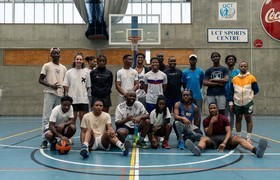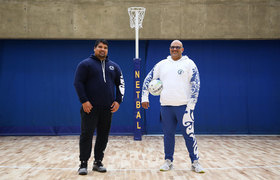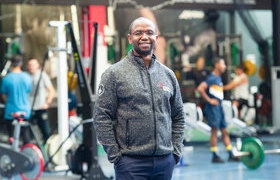UCT cheerleaders redefine inclusivity and embraces sport status
29 December 2023 | Story Thandile Xesi. Photos Ruairi Abrahams. Read time 6 min.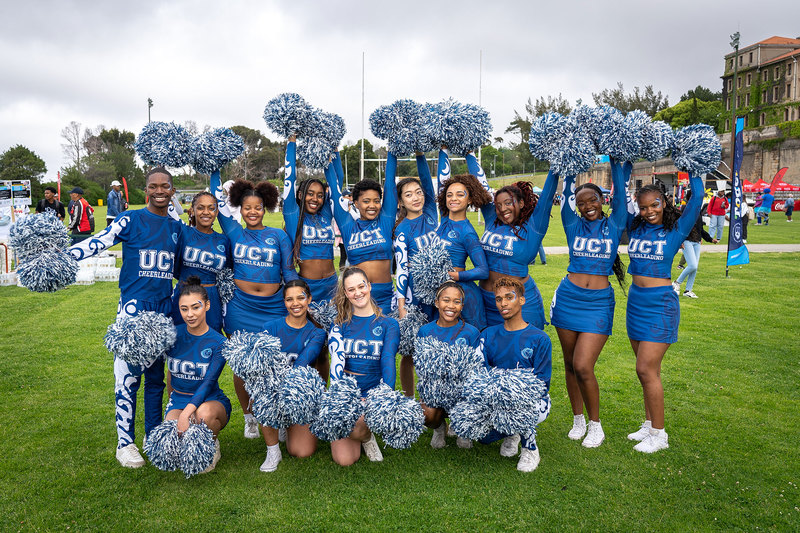
The University of Cape Town (UCT) Cheerleading Club has redefined the sport, focusing on inclusivity and skill development. The shift has sparked widespread interest and the sport has been gaining attention both nationally and internationally.
Having started as just “part of the Ikeys vibe”, focusing on performing during the rugby games, it was only in 2022 that the club’s status changed from a society to being officially recognised as an official sport in accordance with international standards of the International Cheer Union. The union is a member of the Association of International Olympic Committee Recognised International Sports Federations.
Reflecting on the squad’s journey from being a small society to an official sport, one of the choreographers of the UCT Cheerleading Club, Tayla Morrow, said “The UCT Cheerleading Club began as part of the Ikeys vibe, initially focused on rugby. Over time, we expanded to also perform during halftime shows for the basketball team. We were seen more as a society than a sport and managed ourselves without any funding”.
“We started as a small group with big dreams, and despite facing financial challenges, we persevered and worked hard to showcase our talent,” she added.
The club’s hard work and dedication finally paid off when they were approached by UCT Sport to become an official sport.
“We’re now able to participate in major events like the Varsity Cup competition, and we have the resources to continue growing and improving as a club.”
“In 2022, our hard work finally paid off when we gained recognition for our performances during basketball games and were invited to become an official sport.”
This provided the team with much-needed funding and a platform to engage with the university community on a larger scale. “We’re now able to participate in major events like the Varsity Cup competition, and we have the resources to continue growing and improving as a club,” Morrow added.
In addition to their regular performances, the team has also appeared in other media, such as Tyla Laura Seethal’s music video “Getting Late” in 2020.
“These opportunities did not only provide valuable exposure for the team to reach a wider audience, but also marked its entry onto a national and global stage,” she said.
“Cheerleading is no longer just a sideline activity. It requires strength, agility, and coordination, akin to other sports, and our ongoing efforts aim to have it acknowledged as such.”
Diversified auditions
Morrow and team have revolutionised their audition process, emphasising the holistic evaluation of candidates based on their choreography skills, performance quality, attitude, and optional demonstrations of gymnastics abilities.
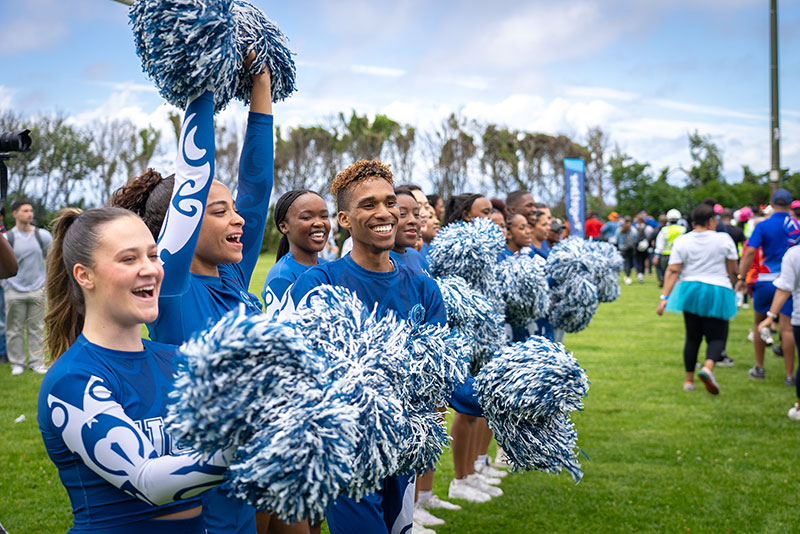
“We welcome individuals from different backgrounds, regardless of their experience in dance or gymnastics. We want individuals who bring positivity and adaptability to the team,” she noted.
While prior experience in dance or gymnastics is not strictly necessary, the team does look for a baseline level of fitness from potential members. “Our auditions are competitive due to the growing popularity of the team, and we need to ensure that new members can keep up with the rigorous practices.”
She explained that while the team has not really attracted much male-identifying people, the team is committed to inclusivity. “We’re a welcoming team that strives to be as inclusive as possible. We don’t discriminate on the basis of gender, sexuality, or any other factor. We encourage anyone interested in joining to reach out, no matter their background. Our goal is to create a team where everyone feels empowered to express themselves and contribute to our shared success,” she said.
“We encourage anyone interested in joining to reach out, no matter their background”
“However, we’re more concerned with a candidate’s ability to learn choreography and perform well, as well as their attitude and personality. We value a positive and supportive environment, so we consider these qualities during the selection process. And while dance and gymnastics skills can be helpful, we provide training throughout the year, so new members don’t need to be experts when they join,” she added.
Rigorous training regimen
The team, which consists of two squads – a competition squad and a social squad – has demonstrated their dedication to excellence through their rigorous training regimen.
“The competition squad is made up of 35 experienced and dedicated cheerleaders who train four to five days a week for around two-and-a-half hours each session. Meanwhile, the social squad is composed of 42 individuals who primarily participate in social events like campus activations and alumni gatherings, where the focus is more on creating a fun atmosphere than intense performances,” Morrow explained.
“Our training instils discipline, teamwork, and perseverance, pushing our cheerleaders to surpass their limits.”
Outreach initiatives and future goals
While the squad scaled back their outreach activities this year due to unforeseen circumstances, Morrow and team are eagerly looking ahead to the future. Community engagement and outreach initiatives will form a significant part of their plans for the upcoming year. “We are keen on extending our support to other communities, bringing cheer to local churches, and using our skills to uplift others,” she said.
Morrow’s passion for the sport is driven by a love for dance which was evident at an early age. She pursued competitive dancing from childhood until university.
“Throughout my life, I have been dedicated to dancing, beginning at the early age of three. I pursued competitive dancing until I had a change of plan and decided to attend UCT, with the intention of majoring in theatre and dance,” said Morrow.
She recently completed her honours in organisational psychology at UCT.
 This work is licensed under a Creative Commons Attribution-NoDerivatives 4.0 International License.
This work is licensed under a Creative Commons Attribution-NoDerivatives 4.0 International License.
Please view the republishing articles page for more information.







